- Home
- Vicki Delany
A Scandal in Scarlet
A Scandal in Scarlet Read online
A Scandal in Scarlet
A SHERLOCK HOLMES BOOKSHOP MYSTERY
Vicki Delany
For my marvelous daughters, Alex, Julia, and Caroline
Acknowledgments
It’s getting difficult to think up cute and clever Sherlock-related titles for the books in this series. So this time I used a team: Mary Jane Maffini, Linda Wiken, Robin Harlick, Barbara Fradkin, Cheryl Freedman, Melodie Campbell, and Jenny Chen. The final decision was mine, but I thank them all for their input.
I’d also like to thank Cheryl Freedman for her keen editor’s eye and Melodie Campbell for helpful advice on boats. As I know nothing at all about boats, any mistakes are strictly mine.
Chapter One
I love owning a dog. I love being owned by a dog. No matter how tough the day has been or how low my mood might be, being greeted at the door by a joyful, exuberant animal is one of life’s greatest pleasures. It’s hard to stay tired or grumpy or in a thoroughly foul mood in the face of those bright eyes, perky ears, lolling tongue, shivering body, and tail wagging hard enough to knock the knickknacks off side tables.
I don’t, however, love having a dog when I get home late, tired and hungry, and have pet-owner duties to perform before I can look after myself. Still, you have to take the (very occasional) bad with the (almost always) good.
“You won’t mind missing your walk just this once, will you?” I said to Violet, the cocker spaniel.
She lowered her head and whimpered. “Okay,” I said. “You win. Give me a minute to change my shoes and we’ll go out. Walk!” I was rewarded by a dance of pure joy.
I was tired. Bone tired. It had been a hard day at work. My shop assistant, Ashleigh, had come down with a dose of summer flu and I had to manage the Sherlock Holmes Bookshop and Emporium myself in the middle of the Cape Cod tourist season. Tourist season means lots of customers and long hours.
Today, the hottest new Sherlock Holmes pastiche novel had been released, and my shop’s order had somehow been lost in the chaos. I’d been turning away disappointed customers all day. Some, I feared, would order online and never return to my little shop at 222 Baker Street.
Next door, at number 220, Mrs. Hudson’s Tearoom, Fiona, one of the waitresses, was down with the same bug as had felled Ashleigh. There was a crisis of some sort involving blueberries, and Jayne Wilson, part owner and head baker, had burst into tears and threatened to walk out the door. Forever. All while the lineup of eager afternoon tea drinkers stretched out the door and down the sidewalk.
Shortly before nine o’clock in the evening, as I was contemplating flipping the sign on the door to “Closed” a few minutes early, a customer came in. I greeted her warmly and told her to let me know if she needed any help.
As it happened, she did need my help. She needed a full explanation of which stories were contained in which volume of the Collected Stories of Sherlock Holmes. She needed to know which short story collections were not too scary and which one contained a story by Hank Phillippi Ryan (Echoes of Sherlock Holmes). She wanted a full plot description of each of the Laurie R. King books and asked if she’d find it too unbelievable that Sherlock Holmes had been to Timbuktu, as described in Sherlock Holmes, The Missing Years: Timbuktu by Vasudev Murthy. Was it realistic, she asked, that Sherlock would have had children, as was the premise of several series, including The Daughter of Sherlock Holmes by Leonard Goldberg? I answered all her questions with a smile and tried not to glance at the clock over the sales counter. Soon the smile turned into a grimace, and I pulled out my phone to check the time. More than once. And not subtly either.
Still she chatted. She picked up and examined every book and then put them back in the wrong place. I ran after her, trying not to be too obvious about reshelving them. Eventually I didn’t worry about being too obvious about it. She liked the Benedict Cumberbatch interpretation of Sherlock, she told me, but Robert Downey Jr.’s not so much. Too frivolous, she thought. Didn’t I agree?
I agreed with everything. Absolutely everything.
All the time she fussed over the shop cat, Moriarty. He wound himself around her legs, he purred, he preened. He allowed her to pick him up and stroke him. Between barking out rapid-fire questions, she complimented him on his regal bearing, his sleek black coat, his friendly personality. Moriarty peered at me from under her arms. He didn’t even bother to try to hide his self-satisfied smirk.
At quarter to ten, the woman put the cat down. “That was so interesting. Thank you. I’ll have to think about it.”
And she left. Unencumbered by any purchases.
I twisted the lock on the door behind her and glared at Moriarty. He yawned mightily and stretched every fiber of his lean body before heading off to his bed under the center table, letting me know that his work was done for the day and he was looking forward to a good night’s sleep.
I, unfortunately, had things to do once I closed the shop. I’d arranged to have a drink after work with my friend Irene Talbot, a journalist with our local newspaper, the West London Star. I managed to send her a text saying I was delayed while the non-shopper fussed over Moriarty. I hoped Irene would tell me not to bother, but her reply said she was waiting.
Once I’d switched off the lights and locked up, I dragged myself down to the Blue Water Café. Irene, so I discovered, had been offered a position at a newspaper in St Louis. It was a good job, but, she moaned, could a Cape Cod girl ever be happy in the landlocked flatlands? She didn’t really want my advice; she needed to use me as a sounding board. I had a drink I didn’t want and sat in my chair on the restaurant’s deck, bouncing her words back to her. It was a beautiful Cape Cod summer’s night; we were sitting outside in the warm evening, looking out over the dark sea, but I could barely keep myself awake.
At long last Irene said, “Maybe I should talk to Joe McManus. He went to Chicago.”
“Excellent idea,” I said, having no idea who Joe McManus was or what might be wrong with Chicago. I waved for the check, said my good nights and staggered home.
I was thinking fondly of my lovely, soft, comfortable bed when I remembered Violet had been alone most of the day. I live with my great-uncle Arthur, and Violet is technically his dog. But right now Arthur was cruising somewhere in the Mediterranean. Our next-door neighbor, Mrs. Ramsbattan, has a key to the house; if I can’t get away from the store during the day, she comes over to fill the water bowl and let Violet out into the enclosed yard. But Mrs. Ramsbattan is almost Uncle Arthur’s age, late eighties, and she needs the assistance of a cane, so Violet doesn’t get a walk.
That task is left up to me. I took the leash off the hook by the mudroom door. Beautiful liquid brown eyes stared lovingly up into mine.
It wasn’t terribly late when we left the house, not much after eleven, but this is a quiet part of a quiet town. Blue Water Place, our street, is a stretch of nice houses and well- maintained gardens. Some of the homes are new, many are renovated, and a handful date from centuries past, such as the 1756 salt box in which Great-Uncle Arthur and I live.
Once I was outside, feeling the caress of warm salty air on my skin and the scent of roses and the sea in my nose, I began to enjoy the walk. Violet wandered back and forth across the sidewalk, sniffing under bushes and at patches in the grass, finding sensations only she could interpret. A startled squirrel darted up a knurly oak as old as my house.
The stretch of harbor at the foot of Blue Water Place is a family-friendly boardwalk of ice cream shops, souvenir stores, and small markets. The lights of the Blue Water Café twinkled in the distance, and lamps from small fishing boats or pleasure craft bobbed gently as the ocean rose and fell.
We turned left at Harbor Road, heading away from town. The lights from the restaurants, sho
ps, and the fishing pier fell away. The fourth-order Fresnel lens of the West London Lighthouse flashed its rhythm of three seconds on, three seconds off, three seconds on, and twenty seconds off. We walked down the silent street, the only sounds the swish of the occasional passing car and the gentle purr of the incoming surf against the rocky shore.
Some of the houses facing out to sea along this stretch of the road are very old. Old by American standards, that is. Not so old for someone born and raised in England, as I was.
The oldest surviving house in West London is now a museum. Built in 1648 by Robert Scarlet and family, who settled in Massachusetts in 1640, it’s called Scarlet House in their honor. The property consists of kitchen and herb gardens and a working barn. The home itself has been carefully restored to its original condition and furnished with authentic period furniture and household utensils. Costumed volunteers work at tending to a few sheep and goats or sharpening scythes in the barn, and baking bread or making cakes over the open kitchen fires. It’s hugely popular with school groups in the spring and tourists in the summer and fall.
As we passed the museum, Violet stopped so suddenly I bumped into her. Her ears stood up, and she woofed, low in her throat. Her head turned from side to side, and her nose twitched, pulling scents out of the air. This was not the stance she used when she detected the presence of a cat or a squirrel. She barked again. I sniffed the air, and at last my feeble human senses caught up with Violet’s. The slightest trace of smoke drifted on the air. Then it was gone. The breeze was blowing inland, bringing us fresh air off the sea.
“What is it?” I said to Violet. She was staring intently at the white picket fence around Scarlet House. The wind shifted slightly, bringing another trace of smoke toward me. Violet barked.
I quickly retraced my steps and peered over the gate. An out-of-place electric light burned over the front door, and a soft glow came from the barn around back. Otherwise, all was in darkness.
Then I saw it. In the front window, a flash of red and yellow. Even as I watched, not yet entirely sure of what I was seeing, the light began to move and to grow.
Fire.
I threw open the gate and ran onto the property. I fumbled in my pocket and found my phone. I dropped the leash, pressed the emergency button, and punched 9-1-1.
“Fire, police, or ambulance?” said a calm voice.
“Fire. Scarlet House, the museum on Harbor Road. I can see flames.”
“Are you safe, madam? Is anyone inside the building?”
“I’m fine. I’m just passing. I’m outside. I’ll check.”
“Please don’t—” she said. Her words were cut off as I shoved the phone back into my pocket.
Violet was barking now, the sound constant and frantic. The animals in the barn bellowed their panic. I ran toward the house. A large padlock was looped through a wooden latch. I pounded on the door. It felt warm beneath my touch.
“Fire! Fire! Is anyone in there?”
No reply.
Hardly any time at all passed before sirens could be heard coming down the street. I continued hammering on the door. It was highly unlikely someone would be inside at this time of night, but it was also highly unlikely the empty building would catch fire. The flames were building now, eagerly gobbling up the old wooden furniture and dusty rugs, biting into the ancient wooden beams. I’d read somewhere that a fire doubles in size every minute. This one was moving faster than that. The entire house would be gone soon.
“Step aside, ma’am,” said a voice. A hand touched my shoulder. I turned to see a man dressed in full bunker gear. His intense dark eyes studied me. “Is anyone in there?”
“Not that I know of. I was passing and smelled smoke. I’m trying to alert them just in case.”
“I need to you get out of the way. Please. You and your dog.”
I looked around. In the—what, five minutes?—since I’d stepped into the yard, the scene had changed totally. Firefighters ran across the lawn, dragging hoses behind them, shouting orders. As though night had ended early, bright light flooded the yard, and red and blue emergency lights filled the street. More sirens approached. The curious were emerging from nearby houses, many dressed in pajamas.
“Is that your dog?” the firefighter said.
Violet stood in the center of the lawn, barking her head off. Her leash trailed on the ground behind her. I smiled at her. She knew better than to get too close to the burning building, but she wasn’t going to run off and leave me alone.
“Yes, she is. The barn. Animals are in there.”
“We’ll take care of that, ma’am.” His voice was polite but firm. He didn’t need any help from me.
I hurried toward Violet, scooped up her leash, and led her off the museum property. There was nothing she and I could do here but get in the way. I wasn’t, at the moment, particularly curious. I’ve been at fire scenes before, and I know how the firefighters operate.
Police were attempting to string tape around the property and keep onlookers back. I spotted a person I knew and headed toward her. “Evening, Officer Johnson.”
Stella Johnson half-turned. “Gemma Doyle. Hi. Can you move away, please?”
“Happy to. I wanted to let you know that I’m the person who spotted the fire and called it in.”
“Detective Estrada’s on call tonight. She’ll be here soon, and you can tell her what you saw.”
“Uh, maybe not. She’ll be busy, and I have nothing of importance to say. I smelled smoke and saw flames in the window and called nine-one-one. I knocked on the door, so it might have my fingerprints. That’s all. I saw no one on the grounds or on the street in the minute or so prior to seeing the fire. I’ll go down to the station in the morning and make a statement.”
“She’d rather talk to you now.”
“I have absolutely no doubt about that. You can tell her I was so traumatized I had to go straight home and lie down.”
Johnson studied me. “A less traumatized witness I’ve yet to see.”
“I don’t display my feelings openly. You know what we English are like. Stiff upper lip and all that. Or so they say. Besides, my dog is traumatized.” Johnson eyed the animal sitting calmly at my feet. Violet wagged her stubby tail. If she could have smiled, she would have.
I gave the leash a slight tug, and we set off home. I might have walked faster than I had earlier. Detective Louise Estrada was not, shall we say, my best friend. She’d be more likely to accuse me of starting the fire in order to attract attention to myself than to hear what little I had to report.
I gave no more thought to the fire or speculated on what might have caused it. The investigators would find out soon enough.
Chapter Two
Rather than me having to go down to the police station, the police came to me the following morning, in the much more pleasant form of Detective Ryan Ashburton. I opened the back door, wiping sleep from my eyes, to find Ryan and an extra-large takeout tea waiting for me.
I took the offered mug without a word and lowered my face to it. Warm, scented steam enveloped me. “Mmm.”
I stepped back and Ryan came in. He greeted Violet with as much enthusiasm as she greeted him. Mutual admiration over, she ran past him into the yard to see what the neighborhood squirrels had been up to in the night.
“To what do I owe the honor of this visit?” I sipped my tea. English breakfast, with a splash of milk, no sugar, prepared properly.
“You’re the hero of the hour,” he said.
“I am?” I didn’t feel much like a hero with bedhead, watery eyes, wearing yellow polka-dot shorty pajamas. No doubt I still had impressions of my pillow pressed into my cheek. It was eight AM. I’d slept soundly, undisturbed by dreams of fire and smoke.
Ryan pressed a kiss onto the top of my head and then dropped into a kitchen chair. I took the other while trying, no doubt fruitlessly, to tidy my mop of wild curls.
“You called nine-one-one last night. The fire at the museum.”
“V
iolet and I were out for our nightly walk, and I saw flames in the window. Modesty forces me to admit that Violet noticed it first. The wind was blowing inland, carrying the smoke away from me. If she hadn’t alerted me, I would have walked on past. I was planning to go up the hill at the next intersection and return home that way.”
“I’ll get the mayor to give the medal to Violet then.”
The hero of the day ran into the kitchen. Ryan gave her a scratch on the top of her head. She’d prefer that to a shiny piece of tin and a colored ribbon any day.
“Do you know what caused it?” I asked.
“The arson investigator was on site first thing this morning. Looks, he says, like a candle had been left to burn down. Louise is talking to the museum staff, and I said I’d handle you.”
I grinned at him. “As if.”
Ryan Ashburton was a good-looking man at any time, but never more so than when he laughed, and he laughed now. Six foot three and solidly built, he had chiseled cheekbones, short black hair and expressive blue eyes, and a strong jaw that seemed as though, no matter how recently he’d shaved, it always had a cover of stubble.
He and I had a complicated connection. We’d been in a serious relationship once, on the point of getting engaged. (Of that fiasco, all of it my fault, the less said the better.) He had moved to Boston for a few years and had come back a couple of months ago when the job of lead detective for the WLPD came open.
And we found that our feelings for each other hadn’t faded.
But I’d run afoul of the West London police before, through absolutely no fault of my own. Things had not gone well for Ryan when the Chief and Detective Estrada thought that I exerted an undue influence on him. Ryan’s career was important to him, and thus to me, and so we stood at a crossroads. Sort of in a relationship, but not fully.
“Were you able to … uh … deduce anything, Gemma?” he asked now.
“I smelled smoke and saw flames. I put those facts together and decided, in an instant, that the museum was on fire. Sherlock Holmes couldn’t have done better.”

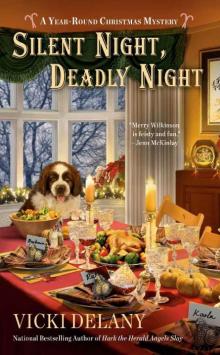 Silent Night, Deadly Night
Silent Night, Deadly Night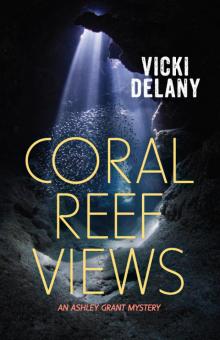 Coral Reef Views
Coral Reef Views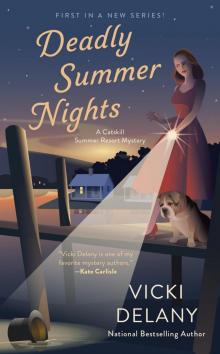 Deadly Summer Nights
Deadly Summer Nights Murder in a Teacup
Murder in a Teacup Whiteout
Whiteout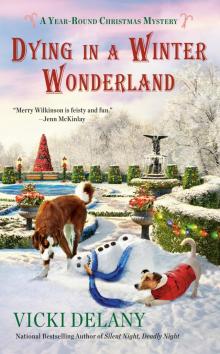 Dying in a Winter Wonderland
Dying in a Winter Wonderland Tea & Treachery
Tea & Treachery Rest Ye Murdered Gentlemen
Rest Ye Murdered Gentlemen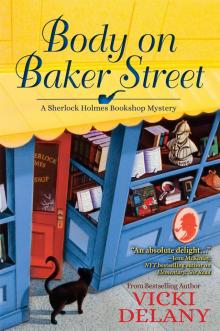 Body on Baker Street: A Sherlock Holmes Bookshop Mystery
Body on Baker Street: A Sherlock Holmes Bookshop Mystery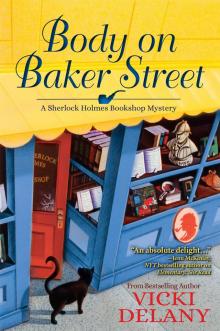 Body on Baker Street
Body on Baker Street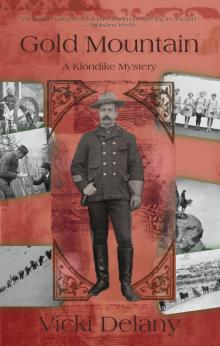 Gold Mountain
Gold Mountain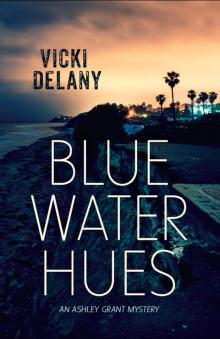 Blue Water Hues
Blue Water Hues Hark the Herald Angels Slay
Hark the Herald Angels Slay Murder at Lost Dog Lake
Murder at Lost Dog Lake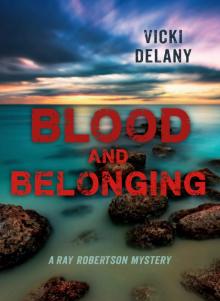 Blood and Belonging
Blood and Belonging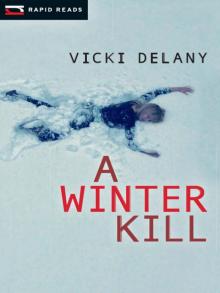 A Winter Kill
A Winter Kill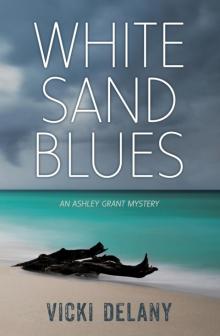 White Sand Blues
White Sand Blues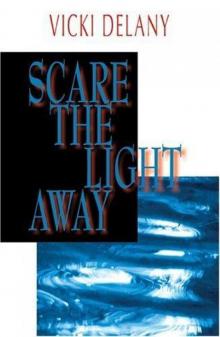 Scare the Light Away
Scare the Light Away Burden of Memory
Burden of Memory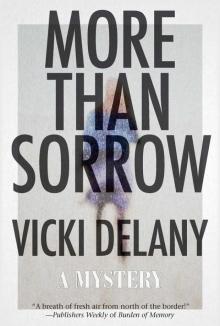 More Than Sorrow
More Than Sorrow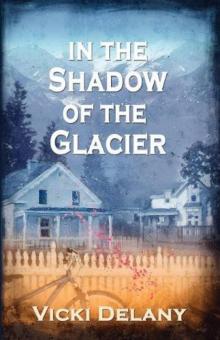 In the Shadow of the Glacier
In the Shadow of the Glacier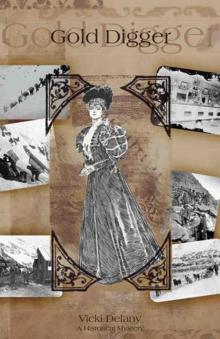 Gold Digger: A Klondike Mystery
Gold Digger: A Klondike Mystery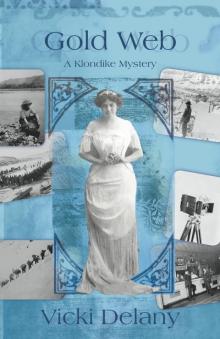 Gold Web
Gold Web Haitian Graves
Haitian Graves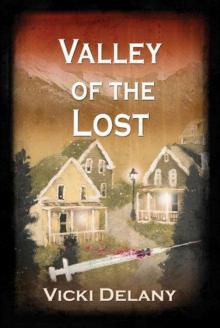 Valley of the Lost
Valley of the Lost We Wish You a Murderous Christmas
We Wish You a Murderous Christmas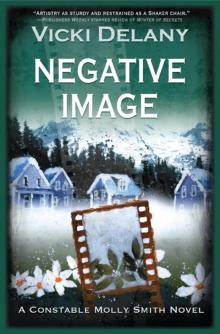 Negative Image
Negative Image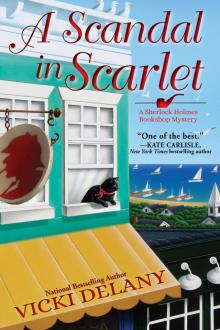 A Scandal in Scarlet
A Scandal in Scarlet Juba Good
Juba Good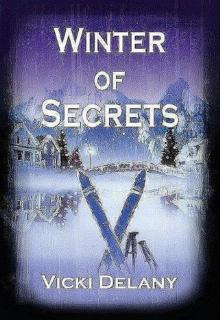 Winter of Secrets
Winter of Secrets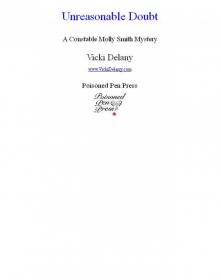 Unreasonable Doubt
Unreasonable Doubt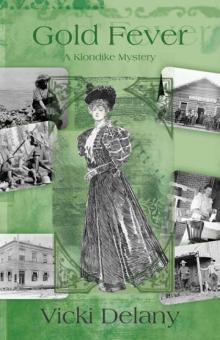 Gold Fever
Gold Fever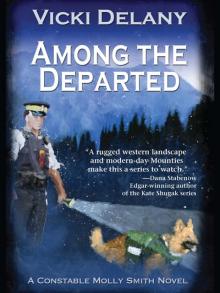 Among the Departed
Among the Departed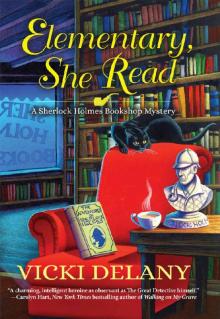 Elementary, She Read: A Sherlock Holmes Bookshop Mystery
Elementary, She Read: A Sherlock Holmes Bookshop Mystery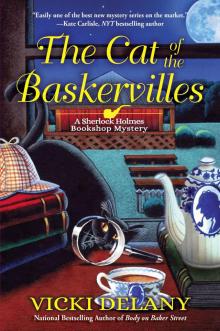 The Cat of the Baskervilles
The Cat of the Baskervilles